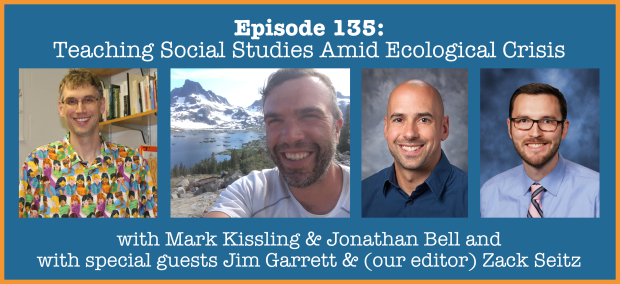In Episode 135, Dan, editor-turned-co-host Zack Seitz, and friend of the pod Jim Garrett chat with Mark Kissling and Jon Bell about their new article in Theory & Research in Social Education titled, “Teaching social studies amid ecological crisis.”

Books, Articles and Other Amazing Resources
- Kissling, M. T., & Bell, J. T. (2019). Teaching social studies amid ecological crisis. Theory & Research in Social Education, 1-31.
- Houser, N. O. (2009). Ecological democracy: An environmental approach to citizenship education. Theory & Research in Social Education, 37(2), 192-214.
- Down to Earth: Nature’s Role in American History (4th Edition) by Ted Steinberg
- A Nation at Risk (maybe we link to a critique of it?)
- Silent Spring by Rachel Carson
- An Inconvenient Truth by Al Gore
- Losing Earth by Nathaniel Rich (Rich, N. (2019). Losing earth: A recent history. New York: Farrar, Straus and Giroux.)
- See the Ishmael series by Daniel Quinn to read a fictional account of a talking gorilla teaching humans how to save the world
- Dan mentioned the “Environment” chapter by Jodi Latremouille in his Keywords in the Social Studies book
- Here is some context on Martin Luther King’s “Beyond Vietnam” and the speech itself
- Dan loves The Lorax by Dr. Seuss, but Jodi Latremouille pointed out how the end of the book placing responsibility with individuals, not corporations or larger structures, for making change (see reference).
- Garrett, H. J. (2019). Learning to tolerate the devastating realities of climate crises: The Uninhabitable Earth: Life After Warming, by David Wallace-Wells, New York, NY, Tim Duggan Books, 2019, 310 pp., $27.00 (hardcover), ISBN 978-0-525-57670-9.
- Recent David Wallace Wells New York Magazine article: http://nymag.com/intelligencer/2019/12/climate-change-worst-case-scenario-now-looks-unrealistic.html
- More information on Jamie Oliver’s “Food Revolution” show
- For more on difficult knowledge, listen to Jim and check out our shownotes: Episode 53: Teaching Difficult Knowledge with Jim Garrett
- Guardian to ban advertising from fossil fuel firms
- The #ClimateChangeChallenge is about identifying actionable climate change at different levels: personal, family, neighbrohood, school, district, state, national, and global levels. More to come!
- Some other sources for teaching climate change:
- Rethinking Schools
- Zinn Ed
- Extinction Rebellion
- Bigelow, B., & Swinehart, T. (Eds.). (2014). A people’s curriculum for the Earth. Milwaukee, WI: Rethinking Schools.
- Choices Program at Brown University. (2015). Justice and responsibility in a changing climate. Social Education, 79, 35-43.
- Harris, C. A., Kharecha, P., Goble, P., & Goble, R. (2016). The climate is a-changin’: Teaching civic competence for a sustainable climate. Social Studies and the Young Learner, 28(3), 17-20.
- Kumler, L. M., & Vosburg-Bluem, B. (2014). Climate change in the social studies classroom: A “why” and “how to” guide using the C3 Framework. Social Education, 78, 225–229.
- Mann, M. E., & Toles, T. (2016). The madhouse effect: How climate change denial is threatening our planet, destroying our politics, and driving us crazy. New York, NY: Columbia University Press.
- Here’s some resources for following you want follow more climate news and activism:
- Democracy Now (@democracynow)
- David Wallace-Wells (@dwallacewells)
- Robert Bullard (possible guest) (“in a conversation about communicating climate change in an engaging and inclusive manner” – https://www.climateone.org/audio/dr-robert-bullard-father-environmental-justice)
- Rebecca Solnit (follow on facebook for a catalogue of “Climate Momentum” for victories and “climate emergency” for setbacks.
- Youth activists (Vox story young activists of color)
- Alexandria Villasenor (Washington Post article about 7th grade strikes against climate inaction)
- Find Xiye Bastida on Twitter at @xiyebastida
- Find Vanessa Nakate on Twitter at @vanessa_vash
- On EcoJustice Education:
- Martusewicz, R. A., Edmundson, J., & Lupinacci, J. (2015). EcoJustice education: Towards diverse, democratic, and sustainable communities (Second edition.). New York, NY: Routledge. http://dx.doi.org/10.4324/9781315779492
- Bowers, C. A. (2001). Educating for eco-justice and community. Athens, GA: The University of Georgia Press.
- Ego v. Eco graphics: https://recyclingsutainabiliy4a.weebly.com/ego-vs-eco.html
Biographies
Mark Kissling is an assistant professor of education at Penn State University, where he teaches, collaborates, researches, and writes about earthen social studies, ecological citizenship, patriotism, and place-based (teacher) education, among other things.
Jonathan Bell is a doctoral candidate in the Department of Curriculum and Instruction at Penn State. His current research explores how education can help build just and healthy communities; resilient, interconnected places; and an ecologically sound earth.
Jim Garrett is a visiting associate professor of social studies education at Teachers College Columbia University. His permanent position is at the University of Georgia where he works in the social studies program.
Zack Seitz is a social studies teacher at Wylie High School, a doctoral student at the University of North Texas, and editor of the Visions of Education podcast! You can find him musing on Twitter at @MrSeitzSS.
Editor
We would like to thank Zack Seitz of Wylie High School (TX) and the University of North Texas for his editing skills, but since he’s on this episode, we feel like he’s getting plenty of audio credit.


